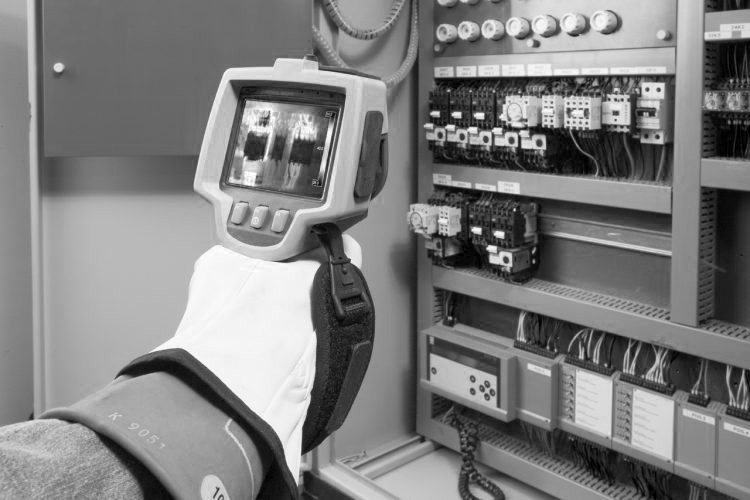Introduction to Swiss Approval Thermography Inspection Services
The specific Swiss Approval Advanced NDT Laboratory for Thermography Inspection is offering a wide range of services, and coordinates applications in the Infrared or Thermal Inspection sector in different areas within or outside Europe.
With our advanced equipment of high characteristics, our experts can discover even small size of defects.
Our equipment characteristics of thermal sensitivity can range from -40C to +600C with an accuracy +/- 2%, with Image format opto-mechanical MicroScan (IR pixels) of 1280 X 960 using a Full-frame by 30 Hz (640 × 480), as well as a Sub-frame by 60 Hz (384 × 288). Since infrared inspection is a superficial inspection, in order to perform a complete inspection, we combine both, superficial and volumetric inspection by UT.
Volumetric control implies to control the volume of the object. The most common control is by ultrasound or ultrasonic test, which requires contact and is non destructive. By means of ultrasound it is possible to measure material thickness and evaluate internal flaws that cannot be reached by infrared inspection.
Application in Yachts / Marine
Infrared inspection can be applied easily in yacht because is a non-contact and non-destructive operation and does not alter the characteristics of the equipment and materials to be inspected.
Depending on type of inspection, there are some requirements that must be met. For hull, keel, rudder, propeller, shaft or ventral fins inspection, the ship should be in dry dock.
Coating Inspection
External coating on hull or structures can be inspected satisfactorily allowing to identify the most common defects, like blisters, cracks, osmosis, degradation and delamination. It is also possible to identify repaired areas and their condition, since the putty used has different thermal properties from the fiber glass or metal.
Osmosis and blistering Inspection Services
Osmosis is a phenomenon caused when a porous media separates a fluid with high salt content from a low salt content fluid. In the ship, the high salt content is sea water, and the low content salt is the air. The porous media is aged fiber glass and coating layers. For steel structures, the porous media are the coating layers only, and the low content salt fluid is any bubble of air entrapped during coating. Salinity through the ocean in the world is not uniform so osmosis can be different depending on the sea. During osmosis the sea water penetrates the coating and creates some underlayer solid salt accumulation. This salt has different thermal properties of the entire hull, so after thermal exciting, it is possible to identify precisely the area interested.
Fiber Glass condition monitoring services
Fiber glass is a material made of glass flakes, mainly silica, bonded in an epoxy resin matrix. The shape of the object plays an influence on the mechanical properties. When completely cured, the different directions of the flakes give an important mechanical resistance which due to shaping flexibility can be used widely in marine industry. Ageing of the epoxy resin is a process which depends on the environment where the ship operates.
Engines Inspection
The performance of the engines, regardless of if they are electric or combustion, can be monitored with an infrared camera. More precisely, if there is some misalignment in the shafts or basement, this vibration will produce an abnormal heating that can be easily seen. It is possible to check the thermal insulation of the motors in order to stop the creation of hot spots inside the ship cabins.
Electrical Installations Inspection Services
Electrical wiring, cabinet and panels, motors and generators, can be assessed through a thermal camera. When current passes through an object, it produces heat due to electron collisions. The heat produced out of the prescribed limits, is a clear image of thermal anomalies.
Commissioning of Combined systems, pre-commissioning with Load start & Load run, Generators transient testing/switching, functional and operational performance, panel joints & busbar testing and monitoring, autonomy testing & Batteries testing as well.
Moisture Inspection
If in a room there is a specific value of humidity and temperature, moisture can be formed on the wall and in more aggressive form, can create mould. Conditions can be created by any mean, but normally can be found when there is a transition from a hot to a cold area. Mould and moisture, viewed through a infrared camera, appear in blue colour because water has a lower temperature/emissivity of the surrounding wall.
Reporting and Certification of Thermography Inspection Services
Due to complexity and importance of the controls above mentioned, the performing operator should be duly qualified in order to ensure the highest skill and technical advise of the area inspected. The regulating standard for qualification of the operator is ISO 9712. Being qualified by this international standard, requires a previous experience endorsed by Swiss Approval.
For coating inspection, Swiss Approval Inspectors are mainly NACE certified, and can perform inspection services of the highest value. Swiss Approval Certified Personnel includes UT and Advanced UT Level II experts, in order to execute specific inspection activities on materials and parts. Depending of the nature of service, a Swiss Approval Report or Certificate of Conformity can be issued, after completion of inspection and the related technical review.
Swiss Approval advanced NDT Laboratory can provide full inspection service, superficial and volumetric, on coatings, mechanical and electrical parts of any construction or ship. Welding inspectors and qualified Welding Engineers can monitor and inspect any repair or work on steel parts. Our staff is fully qualified and certified according to ISO 9712 for non-destructive examinations, ultrasonic, infrared, liquid penetrant, magnetic particle and x-ray film interpretation. NACE and / or FROSIO certified coating inspectors can evaluate the condition of the external coating and provide monitoring to tailored repair activities, according customer / project needs.
Our Advanced NDT Laboratory operations are conformed with ISO 17025 requirements.

